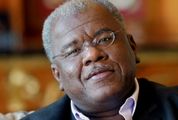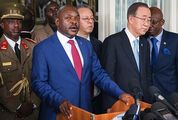NAIROBI — Investors are yanking their cash from African assets, until recently a popular play for the adventurous, as a toxic confluence of factors overhangs the continent.
Crashing commodity prices, a Chinese slowdown and a string of policy failures are forcing investors to reassess the risk of investing in Africa after years of optimism about its growth prospects.
Stock markets and currencies have been selling off across the continent, especially in commodity-dependent economies.
Nigeria, the continent’s largest economy and longtime investor darling, has one of the world’s worst-performing stock indices this year, down 14% since the start of 2016.
The S&P Nigeria BMI index lost more than one-quarter of its value last year as measured in dollars, 10 percentage points more than the average frontier-market index the company tracks.
The S&P Zambia Index has fared even worse over the past year, plunging 45% as the country’s copper exports tumbled on softening Chinese demand.
President Edgar Lungu last September called for a day of national prayer to petition God to shore up Zambia’s currency, the kwacha.
At the time, the kwacha had lost 45% of its value against the dollar in 2015.
The declines mean African equities are performing worse than any other frontier markets. The MSCI Africa index tumbled 19% last year, significantly more than the overall MSCI Frontier Markets index.
The outlook could get darker: the International Monetary Fund in January warned the continent would on average grow 4% this year, sharply below trend growth over the past decade and up only slightly from last year’s 3.5%, the slowest in two decades.
Policy missteps, such as Nigeria’s refusal to devalue its currency, or Ghana’s overspending that led to record debts, haven’t helped.
The drumbeat of bad economic news from Africa is also souring the continent for international corporations.
UK-based lending giant Barclays recently said it would start divesting from the continent after a century of investment, through a sell-off of its share in Barclays Africa Group.
Fund managers say assets in African nations are being punished because of their disproportionate reliance on resources and failure to use the commodity boom of recent years to industrialise their economies.
In Angola, Nigeria and Equatorial Guinea, oil counts for more than 90% of export revenue, while copper counts for more than 70% of export revenue in Zambia.
"There’s a reaction to a year ago, to the euphoria of new investors coming into Africa," said Stuart Culverhouse, an economist with Exotix, a London-based frontier fund and advisory firm.
"They are trying to get out now, and they are being quite indiscriminate."
The upshot is that frontier investors are moving their money from Africa to Asian countries such as Pakistan, Bangladesh and Vietnam; net energy and commodity importers that have shown more commitment to industrialisation.
The investor exodus is already hitting African companies adjusting to the sharp reversal in sentiment. Bereft of choices for desperately needed financing, they now face less-liquid and thinner stock markets at home.
In Nigeria, for example, more than $500m in fresh capital was raised on the stock exchange in 2014, but only $23m in 2015.
Companies are facing thinner chances of raising financing and have to do it in local, devaluing currency such as the Nigerian naira, instead of euros or dollars, which would have been backed by international investors now bolting or waiting it out, Andew Del Boccio, an associate director at PwC in SA, says.
The shift has also pushed up the costs of sovereign borrowing, even as African countries slow down their issuance of bonds in international capital markets.
In 2014, African sovereigns issued $12bn worth of bonds in international capital markets; last year it was half that, according to Deutsche Bank.
Ghana, mired in an economic crisis, issued the most expensive African Eurobond in history late last year, paying a whopping 10.75% for $1bn — far higher than the single-digit interest rates the government had become accustomed to paying for international bonds in recent years.
Although some of Africa’s most rapidly growing economies are being roiled by market turbulence, there are important exceptions to the rule: Kenya, which has a more diversified economy, and Côte d’Ivoire, the world’s top producer of cocoa, are still attracting frontier investors.
Analysts say these countries are bucking the trend because they are energy importers and have sounder public policies that generate confidence.
Côte d’Ivoire’s stock exchange, for example, bucked all trends and gained 7% over the course of 2015; Kenya’s marked big losses but has been in the black in the new year.
"What you’re getting increasingly is a more sophisticated asset allocation within the frontier markets class, that will benefit Kenya, Tanzania and other commodity and energy importers," said Aly Khan Satchu, CEO of Nairobi-based investment firm Rich Management.
Some seasoned frontier-market investors say prices have already fallen to offer enticing, long-term buying opportunities.
"One of the biggest flaws when investors look at Africa is that they think of it as a country, and not a continent composed of very unique countries and companies," says Laura Geritz, who runs US-based Wasatch Frontier Emerging Small Countries.
Ms Geritz says one-quarter of her fund’s assets are invested in Africa and she has made no reductions there over the past few months.
"Africa’s countries can no longer depend on a booming export market for resources to China," Ms Geritz added. "Africa will have to depend on its greatest asset — it’s pool of young, bright, driven people."
More Africa news from The Wall Street Journal
More news from The Wall Street Journal
Premium access to WSJ.com: $1 a week for 12 weeks

Africa. Picture: ISTOCK
NAIROBI — Investors are yanking their cash from African assets, until recently a popular play for the adventurous, as a toxic confluence of factors overhangs the continent.
Crashing commodity prices, a Chinese slowdown and a string of policy failures are forcing investors to reassess the risk of investing in Africa after years of optimism about its growth prospects.
Stock markets and currencies have been selling off across the continent, especially in commodity-dependent economies.
Nigeria, the continent’s largest economy and longtime investor darling, has one of the world’s worst-performing stock indices this year, down 14% since the start of 2016.
The S&P Nigeria BMI index lost more than one-quarter of its value last year as measured in dollars, 10 percentage points more than the average frontier-market index the company tracks.
The S&P Zambia Index has fared even worse over the past year, plunging 45% as the country’s copper exports tumbled on softening Chinese demand.
President Edgar Lungu last September called for a day of national prayer to petition God to shore up Zambia’s currency, the kwacha.
At the time, the kwacha had lost 45% of its value against the dollar in 2015.
The declines mean African equities are performing worse than any other frontier markets. The MSCI Africa index tumbled 19% last year, significantly more than the overall MSCI Frontier Markets index.
The outlook could get darker: the International Monetary Fund in January warned the continent would on average grow 4% this year, sharply below trend growth over the past decade and up only slightly from last year’s 3.5%, the slowest in two decades.
Policy missteps, such as Nigeria’s refusal to devalue its currency, or Ghana’s overspending that led to record debts, haven’t helped.
The drumbeat of bad economic news from Africa is also souring the continent for international corporations.
UK-based lending giant Barclays recently said it would start divesting from the continent after a century of investment, through a sell-off of its share in Barclays Africa Group.
Fund managers say assets in African nations are being punished because of their disproportionate reliance on resources and failure to use the commodity boom of recent years to industrialise their economies.
In Angola, Nigeria and Equatorial Guinea, oil counts for more than 90% of export revenue, while copper counts for more than 70% of export revenue in Zambia.
"There’s a reaction to a year ago, to the euphoria of new investors coming into Africa," said Stuart Culverhouse, an economist with Exotix, a London-based frontier fund and advisory firm.
"They are trying to get out now, and they are being quite indiscriminate."
The upshot is that frontier investors are moving their money from Africa to Asian countries such as Pakistan, Bangladesh and Vietnam; net energy and commodity importers that have shown more commitment to industrialisation.
The investor exodus is already hitting African companies adjusting to the sharp reversal in sentiment. Bereft of choices for desperately needed financing, they now face less-liquid and thinner stock markets at home.
In Nigeria, for example, more than $500m in fresh capital was raised on the stock exchange in 2014, but only $23m in 2015.
Companies are facing thinner chances of raising financing and have to do it in local, devaluing currency such as the Nigerian naira, instead of euros or dollars, which would have been backed by international investors now bolting or waiting it out, Andew Del Boccio, an associate director at PwC in SA, says.
The shift has also pushed up the costs of sovereign borrowing, even as African countries slow down their issuance of bonds in international capital markets.
In 2014, African sovereigns issued $12bn worth of bonds in international capital markets; last year it was half that, according to Deutsche Bank.
Ghana, mired in an economic crisis, issued the most expensive African Eurobond in history late last year, paying a whopping 10.75% for $1bn — far higher than the single-digit interest rates the government had become accustomed to paying for international bonds in recent years.
Although some of Africa’s most rapidly growing economies are being roiled by market turbulence, there are important exceptions to the rule: Kenya, which has a more diversified economy, and Côte d’Ivoire, the world’s top producer of cocoa, are still attracting frontier investors.
Analysts say these countries are bucking the trend because they are energy importers and have sounder public policies that generate confidence.
Côte d’Ivoire’s stock exchange, for example, bucked all trends and gained 7% over the course of 2015; Kenya’s marked big losses but has been in the black in the new year.
"What you’re getting increasingly is a more sophisticated asset allocation within the frontier markets class, that will benefit Kenya, Tanzania and other commodity and energy importers," said Aly Khan Satchu, CEO of Nairobi-based investment firm Rich Management.
Some seasoned frontier-market investors say prices have already fallen to offer enticing, long-term buying opportunities.
"One of the biggest flaws when investors look at Africa is that they think of it as a country, and not a continent composed of very unique countries and companies," says Laura Geritz, who runs US-based Wasatch Frontier Emerging Small Countries.
Ms Geritz says one-quarter of her fund’s assets are invested in Africa and she has made no reductions there over the past few months.
"Africa’s countries can no longer depend on a booming export market for resources to China," Ms Geritz added. "Africa will have to depend on its greatest asset — it’s pool of young, bright, driven people."
More Africa news from The Wall Street Journal
More news from The Wall Street Journal
Premium access to WSJ.com: $1 a week for 12 weeks






















Data supplied by Profile Data
Change: -1.43%
Change: -1.14%
Change: -0.95%
Change: 0.00%
Change: -1.25%
Data supplied by Profile Data
Change: 2.13%
Change: 1.81%
Change: 2.23%
Change: 2.66%
Change: 2.24%
Data supplied by Profile Data
Change: 1.33%
Change: 0.85%
Change: 1.24%
Change: -0.20%
Change: -1.51%
Data supplied by Profile Data